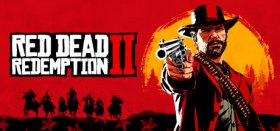
Some Thoughts on Red Dead Redemption 2
Red Dead Redemption 2 is a tour de force. There’s no other way to put it. The level of ambition (and overtime) thrown into the game is astounding. Rockstar, which obviously has very high standards it wants its games to live up to, can no doubt be extremely pleased with the reception the Red Dead 2 has received.
The writers at the company have obviously gone all-out into creating a (get your cliche bingo card ready) living, breathing world full of fleshed-out characters. Central to the core story of the game is the Van der Linde gang, which the player will be spending a vast majority of their time hanging around with.

The Van der Linde gang are a group out of time. The modernisation of the Wild West is catching up to them, forcing the group to continually move around and avoid the law. The gang’s resistance towards, and reluctance to embrace, the rapid industrialisation of late 1800s America is a key theme across the game. The United States - a sleeping giant on the geopolitical stage in the early 20th century - is slowly rousing itself. Manifest Destiny is a long forgotten rallying cry - Native Americans have been relegated cruelly to their reservations and nature herself is being tamed by the locomotive. As you could imagine, Red Dead 2 is littered with the best and worst of booming industrialised capitalism.
The game and its characters rail against this change and all that it brings. The world is shown to be deeply unfair and stratified. People are living hand-to-mouth on what little they can earn while others swan around in huge mansions. The player must spend a good chunk of their time donating any cash they may earn towards their gang, to help prop them up and keep morale high. Throughout the story, just when things begin to look up for the Van der Linde group, another setback knocks them for six. If anything can claim to be the Great American Novel in videogame form, it’s Red Dead Redemption 2.

Yet, though it creates a world rich in its personification of an era, and then places the player in the shoes of one of gaming’s deepest characters - Arthur Morgan - the game fails to truly strike home with its message. At first, the player struggles to afford the basics and must hunt, fish and trade for a living, as well as trying to upgrade his camp and support fellow gang members. This creates an interesting and satisfying feedback loop, and means that players get to experience every facet of money-making the game has to offer.
However, by Chapter Three the game starts handing out missions involving big scores. During my playthrough, I went from having around $300 dollars at most to suddenly carrying around $2,500. When the most expensive items in the game cost only $150-200, it essentially breaks everything the system builds up in the first half of the game. By the game’s end, the main character can hand out money like some land baron making it rain. While the world around Arthur Morgan is shown to be grim and brutal, and while people struggle to make ends meet, the player loses the possibility to feel that alongside the narrative. I mean, it’s hard to take a cutscene of the gang talking about needing “one last score” seriously while Arthur stands there in a three-piece suit, carrying the most expensive rifle in the game modified to the tune of $500.

To reiterate, Red Dead Redemption 2 is a masterful piece of art, and will likely go down as a touchstone for quality, much like its predecessor did. Though I finished the game full of admiration for what the development team achieved, I felt like there had been a real opportunity for the game to make an even deeper impact, to make a statement about the dangers inherent in pursuit of wealth, and showcase the birth of violent, immorale capitalism. Within a hair’s breadth, it was just missed. It is a small flaw in an otherwise incredible title, admittedly. But, like a dead pixel on my monitor, or a smudge on my spectacles, it’s something I just can’t ignore.









COMMENTS